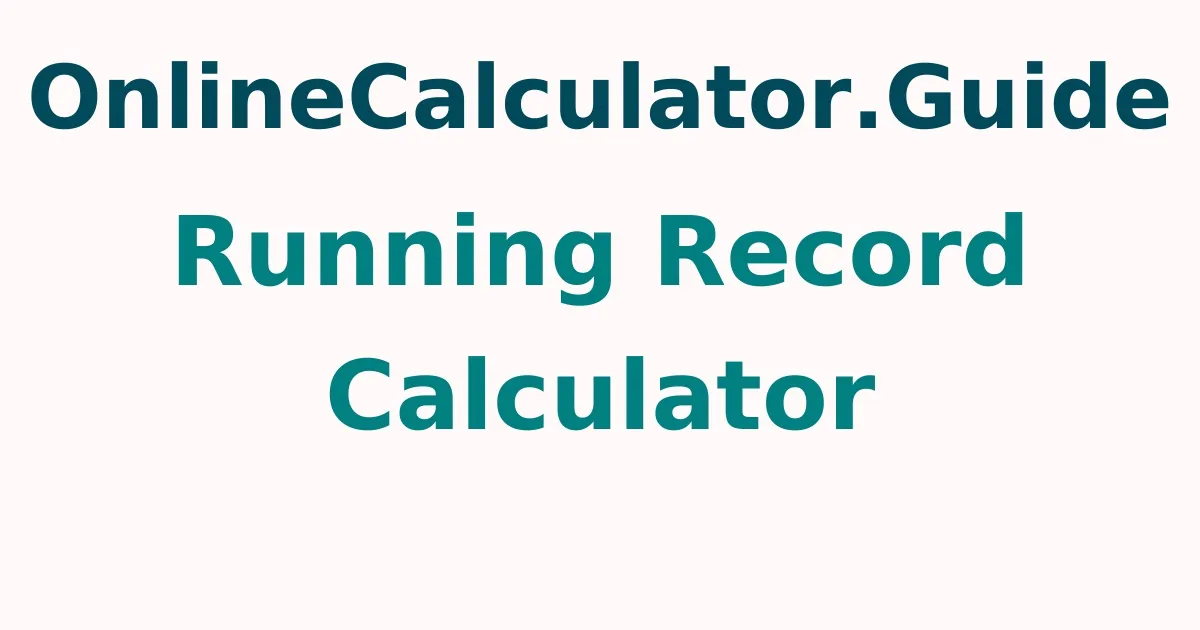Running Records Calculator
Make use of our free Running Record Calculator when you want to know the valid scores for your reading assessments. This handy calculator tool gives the outcomes in a fraction of seconds by taking the input question like error numbers, self-correction numbers and running words. Simply enter your input in the fields provided and click the calculate button to get the output within seconds.
What is a Running Record?
Students during their school, read out the study books loudly. Running records is a method to check the progress of a student while they are reading. A psychologist & literacy expert Marie Clay developed this method of reading.
How to Best Use Running Records?
One can score a student's reading performance in the following way:
- Only count the running words in a given text. (Don’t count captions, subtitles, titles, etc.)
- In the case of any of these, it is counted as one error:
- Substitutions
- Permissions
- Wrong attempts
- Failed appeals
- Already told words
- Additions
- And these should not be counted as errors:
- Correction by a reader
- A repeat of words or sentences
- Correct attempts
- Result-oriented appeals
- Different pronunciations due to a different accent
- In the case of a line or sentence, each word should be counted as a single error.
- If a whole page is skipped, then count that as a single error while removing that page's word count from the total.
- For repeated improper noun pronunciations, count all mistakes as only one error. You can also use reading record calculator or running reading record calculator or running record calculator with timer.
Running Record Conversion Chart
|
Error Rate |
Per cent Accuracy |
Reading Level |
|
1:200 1:100 1:50 |
99.5 99 98 |
98%-100% accuracy with adequate comprehension is called independent level |
|
1:35 1:25 |
97 96 |
Levels L-Z 95%-97% accuracy with adequate comprehension is called Instructional level |
|
1:20 |
95 |
Levels A-K 95% accuracy and higher with adequate comprehension is called independent level |
|
1:17 1:14 1:12.5 1:11.75 1:10 |
94 93 92 91 90 |
Levels A-K 90%-94% accuracy with adequate comprehension is called instructional level |
|
1:9 1:8 1:7 1:6 1:5 1:4 1:3 1:2 |
89 87.5 85.5 83 80 75 66 50 |
Hard level: appropriate for shared reading and reading aloud to children |
Manual Method with Steps for Scoring a Running Record
- For a record, calculate the Error Ratio using the formula
Error Ratio = Errors / Running Words
For better understanding, the Error Rate should be 1:10 or less.
- The percentage of accuracy is calculated by this formula
% Accuracy = (Running Words − Total Errors) ÷ Running Words ×100
- Calculate the Self-Correction Rate.
Self-Correction Rate = (Self-Corrections) / (Errors + Self-Corrections)
The ratio of self-Correction Rate of 1:5 or below shows that a student is conscious of their reading activity & trying to improve more.
- After making a calculation for % accuracy and self-correction rate, the score can be categorized from the chart given above.
onlinecalculator.guide is a free and useful website including several calculator tools for solving problems. Understanding the concepts more clearly becomes very easy with these simple tools.
Example:
A student is reading a passage with 46 words in 30 seconds with 1 error & 1 self-correction. Calculate error ratio, accuracy & self-correction rate. Reading accuracy calculator can helop let's see.
Solution:
Use the formula for error ratio
Error Ratio = Errors / Running Words = 1:46
The formula for accuracy is
Accuracy = (Running Words − Total Errors) / Running Words ×100
= [(46 - 1) / 46] x 100 = 97.83%
The formula for self-correction is
Self-Correction Rate = (Self-Corrections) / (Errors + Self-Corrections)
= (1) / (1 +1) = 1:2
Here, from the above result, we can conclude that the reading level of a student is independent.
FAQ's on Free Tool to Calculate the Running Records
1. Do repeats count as errors in running records?
If the word is a proper noun, it will be counted for the first time only. Otherwise, it will be counted every time.
2. Are running records summative or formative?
Running records are a formative assessment and are one way to note down teacher observations of reading behaviours.
3. How long should a running record take?
100 to 150 words provide a good sample for the processing.
4. How often should I do a running record?
Transitional readers should be assessed every 4 to 6 weeks, While Higher level readers should go through 3 benchmark assessments per year.
